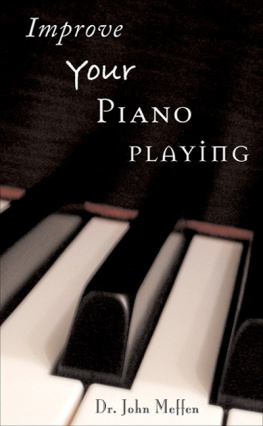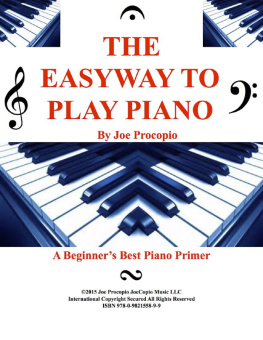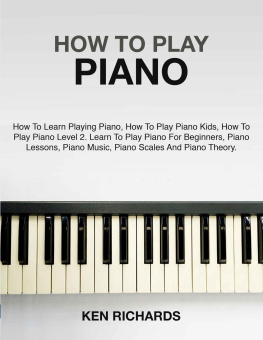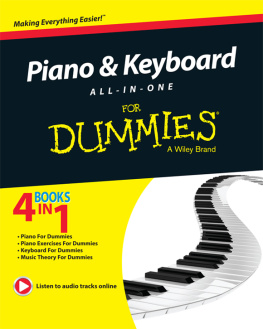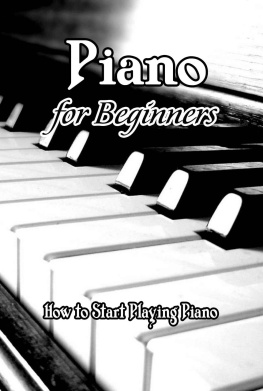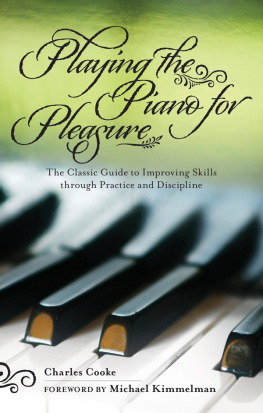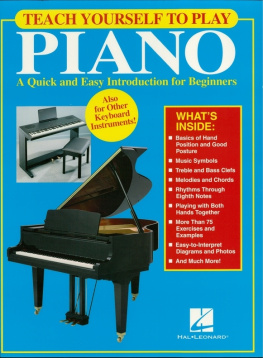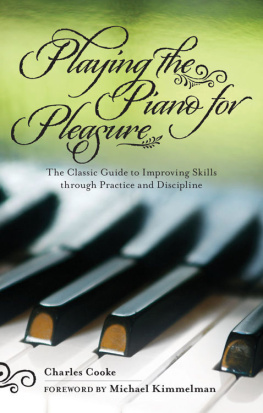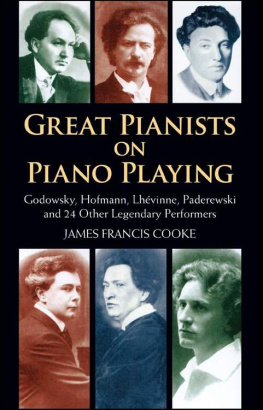

2007 Dr John Meffen MMI
All rights reserved. Copyright under Berne Copyright Convention,
Universal Copyright Convention, and Pan-American Copyright
Convention. No part of this book may be reproduced, stored in
a retrieval system, or transmitted in any form, or by any means,
electronic, mechanical, photocopying, recoding, or otherwise,
without prior permission of the publisher.
11 10 09 08 07 5 4 3 2 1
Published by Allworth Press
An imprint of Allworth Communications, Inc.
10 East 23rd Street, New York, NY 10010
Cover design by Derek Bacchus
Page composition/typography by SR Desktop Services
ISBN-13: 978-1-58115-476-4
ISBN-10: 1-58115-476-3
eBook: 978-1-58115-806-9
Library of Congress Cataloging-in-Publication Data
Meffen, John.
Improve your piano playing / by John Meffen.
p. cm.(The right way).
Includes index.
ISBN-13: 978-1-58115-476-4 (pbk.)
ISBN-10: 1-58115-476-3 (pbk.)
1. PianoInstruction and study. I. Title.
MT220.M49 2007
786.2'193dc22
2006038406
This book was previously printed in Great Britain as part of the Right Way Plus series, published by Elliot Right Way Books.
Acknowledgements
It was the remark what you are talking about is facilitation at the synapses, made by my friend and pupil the late Dr Mavis Taylor, which first set me thinking and reading about the workings of the mind, not just the working of the muscles, in connection with piano playing. This book is a direct result of that chance remark.
I am much indebted to Sir James Beament, who was for many years the Head of the Department of Applied Biology at the University of Cambridge, for reading various chapters of the book. His suggestions and advice helped clarify my thinking on many aspects, as well as bringing my information up to date.
My thanks to Mike Frankton who made such a professional job of setting the musical notation which appears at various points in the text.
Many thanks too, to my wife, Kathleen, who, though sorely neglected in favour of books, a piano, and a computer, still offered to draw the excellent illustrations which add so much to the text, and the pictures which bring a touch of humour to the book.
I would also like to express my thanks to Cassandra Birmingham the editor at Elliot Right Way Books who guided matters with a steady hand and made many helpful suggestions throughout the editorial process.
Finally, I would like to thank my many pupils who, over the years, have made me think of ways to keep the complications of piano playing in my mind while, hopefully, not implanting them in theirs.
End of Chapter Questions
Throughout this book, each chapter ends with a series of questions, the answers to which may be found by re-reading the chapter concerned.
Introduction
The music teacher came twice a week to bridge the awful gap between Dorothy and Chopin. My task, not so daunting as that in George Ades quip, is to bridge another awful musical gap. There are many books about music, musical history, musical appreciation (whatever that happens to be), harmony, counterpoint, musical forms and the like, and also many about piano technique, but explanations of exactly how these two aspects, general musical knowledge and specific information on how to play the piano, can be brought together are hard to find. It is this gap that I hope to fill.
There are many versions of the following anecdote; I give it in the way I first heard it. A young musician had travelled to London to attend a Promenade concert. Coming out of Kings Cross station, somewhat bewildered by the number of people, and not knowing which way to go, he approached a gentleman whose face seemed to be familiar and asked Can you tell me the best way to get to the Albert Hall? The answer was unexpected, Practise man, practise! The familiar face had belonged to Louis Armstrong.
As musicians we are constantly told to practise, this or practise that, not to forget to practise or not to skimp our practice. But there is more musical dirty-work, sculduggery, and damage done in the name of practice than in any other musical pursuit. Everyone knows that it is necessary to practise few know how to do it.
The essence of wasted practice time is crystallised in the much used admonition, That was wrong do it again. If something is wrong, the worst possible course of action is to do it again. This implies the hope that, by some miracle, it will come right by itself next time. If it does, it is usually more by luck than management and the luck is unlikely to hold. If something is wrong, active and positive steps must immediately be taken to ensure that it is not wrong next time. If they are not, and the mistake is allowed to continue, it might, in the end, prove difficult, or even impossible, to eradicate. This is sad because with careful, but enjoyable, work it is possible, within the natural limits of every player, to acquire a sound and reliable technique.
My objective is to help anyone who wants to improve their piano playing. Since it is impossible to improve upon anything which does not already exist, I need to assume that the reader has at least some pianistic ability. That ability need not be great. The ways of working and thinking outlined in the following pages can be adapted to the needs of musicians of all stages, ages, and abilities. They are as appropriate for the beginner as for the serious student. They will also be helpful to parents with little musical knowledge who wish to help their children; they can, in fact, be of value to anyone wishing either to improve their own playing or to help others improve. Although specifically directed towards piano playing, many of the methods outlined can readily be adapted for use with other instruments.
Chapter 1:
Your Piano
An obvious opening to a study of how to improve your piano playing is to look at the piano itself, how it works, and what, from a players point of view, makes it good or not so good. It will help you to understand more clearly what it is you are doing and aiming for, as well as how to achieve your goal of becoming a competent player, if you consider the attributes of the instrument on which you will be practising, and compare them with other pianos.
You probably have a piano already, but, if you do not, here are some things to bear in mind which will help your choice when buying one. It is always worth remembering that, however accomplished you are or you eventually become, you will only be capable of playing as well as your piano will allow. The following observations are mainly aimed at choosing an upright instrument, since they are the ones most likely to be found in the majority of homes, but many of the observations, particularly in reference to string lengths, apply to grand pianos too. After you have read them, and judged how well or badly your present piano measures up, you might even consider a change.
The tone of your piano is probably the most important factor to consider. There are many ways of judging piano tone, but since you will be using the instrument it is what suits you that counts. As well as tone there is also the feel of the action to consider, is it too heavy or too light? Again, it is what suits you that matters. The size and general appearance of an instrument can also be important. How a piano will fit into your room for size and style, as well as its musical qualities, can influence your choice. And finally, do you wish to go for a new or a used piano? In the end you must be the judge of these things, but help can be given in making your choice.
Next page
